How the plan for a “small victorious war” with Japan failed
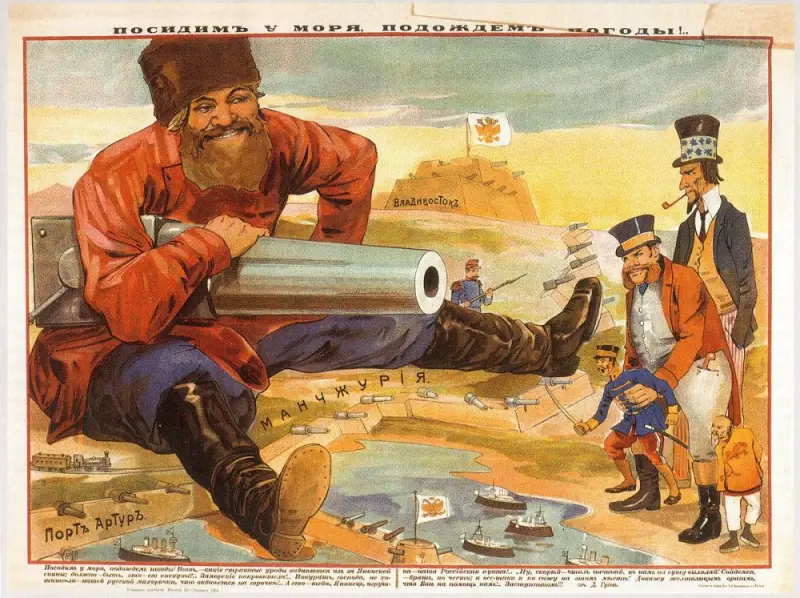
Russian poster of the beginning of the war: “Let's sit by the sea, wait for the weather”
Japanese Threat Assessment
The war with Japan was apparently one of the most predictable stories. The Japanese armed forces held a dress rehearsal for it during the Sino-Japanese War of 1894–1895. The Japanese launched a surprise attack on China, Chinese the fleet. The Japanese army landed in the Korean port of Chemulpo, where it was the most convenient place for landing. The Japanese will land there in 1904.
A number of sensible Russian military leaders understood all this very well. Unfortunately, no one in St. Petersburg heard their voice. Russia was not ready for war in the Far East.
Thus, on March 8, 1900, Russian Vice Admiral Stepan Osipovich Makarov handed over a note “Opinion on the organization of Port Arthur” to the Main Naval Headquarters. In it, he noted the insufficient ground defense of Port Arthur, which could lead to dire consequences. At least 447 guns were required to defend the fortress, but only 200 guns were assigned.
Makarov noted the fact that The Japanese will first of all occupy the Korean Peninsula, and the Russian fleet, cut off from its bases, will not be able to prevent their landing. Then the Japanese army will move to the Kwantung Peninsula and will be able to quickly concentrate more forces there than we have. As a result, it will be a war for the possession of Port Arthur. Port Arthur will become a symbol of the Russo-Japanese War. The fall of Port Arthur will deal a terrible blow to Russia's position in the Far East. Thus, the Russian admiral almost completely predicted the entire course of the future war.
In the pre-war period, in Russian high society there were widespread anti-Japanese sentiments. Admiral Pavel Tyrtov, manager of the Naval Ministry, responded to Makarov’s note with a long resolution, accusing the admiral of alarmism.
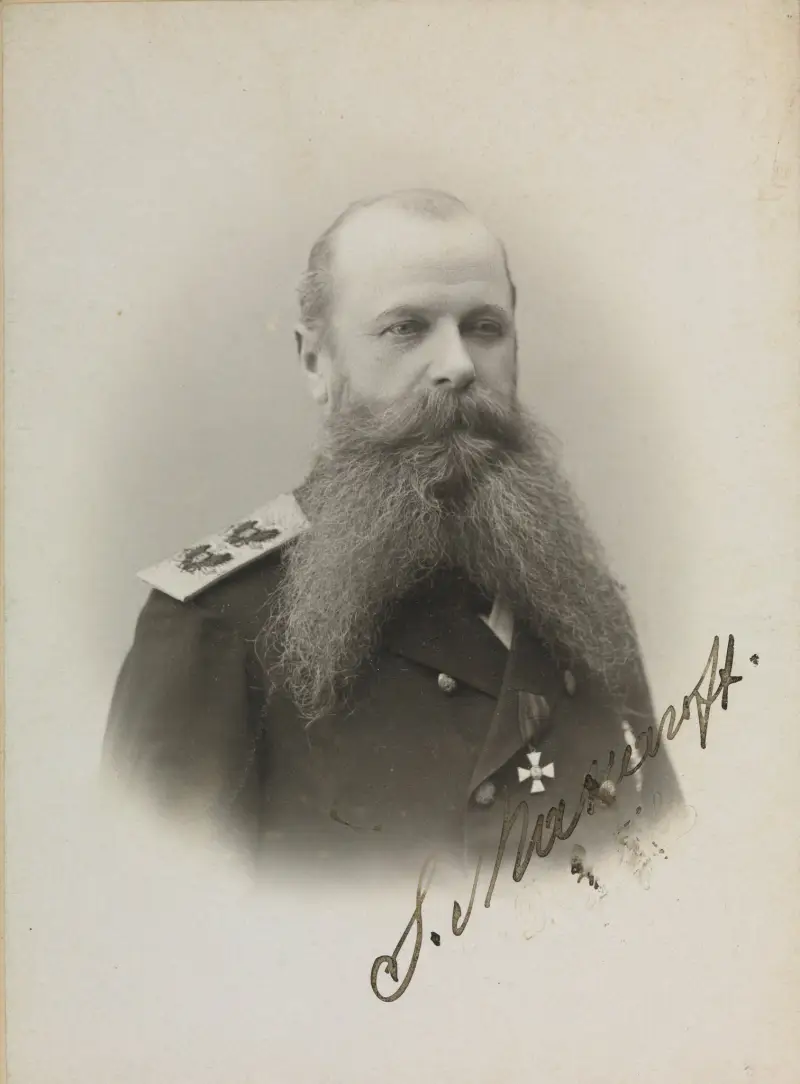
Russian naval leader, hero of the Russo-Japanese War, oceanographer, polar explorer, shipbuilder, Vice Admiral Stepan Osipovich Makarov (1849–1904). After the outbreak of the Russo-Japanese War, he was appointed commander of the Pacific Squadron on February 1 (14), 1904, and arrived in Port Arthur on February 24 (March 8). He supervised the actions of ships during the defense of Port Arthur, but soon died on the battleship Petropavlovsk, which was blown up by a mine.
In August 1903, Minister of War Alexei Kuropatkin, in a report to Emperor Nicholas II, said that the fortification of Port Arthur was at the final stage, and with a sufficient garrison and supplies it would be impregnable from land and sea. The garrison of the Kwantung Peninsula has been sufficiently strengthened, a year's reserve has been created and will withstand the blow of even the main forces of the Japanese army. A safe harbor is being created for the Pacific squadron, and it will be able to “calmly” measure its strength with the entire Japanese fleet.
As a result, Port Arthur, secured from sea and land, having a strong garrison and supported from the sea by a powerful fleet, represents an independent force. There are enough reserves in Port Arthur to wait for the moment when our troops in Manchuria can gather strength and defeat the Japanese army, liberating Port Arthur, Kuropatkin believed. Now you can “not worry” about Port Arthur’s isolation from Russia and the Amur region and even reduce spending on the defense of the Far East. As we see, Kuropatkin was decisively mistaken in his calculations. Makarov's assessment was much closer to the real picture.
On November 5, 1903, the head of the Provisional Military Staff of the Governor in the Far East, Major General V.E. Flug, handed over a report to Governor Alekseev, which outlined the scenarios for the Japanese offensive. The Japanese could:
1) limit the seizure of the Korean Peninsula;
2) having captured Korea and created bases there, direct the main attack on Russian troops in Southern Manchuria and Port Arthur;
3) deliver the main blow to Vladivostok and the South Ussuri region. At the same time, the Japanese armed forces could conduct a auxiliary operation to capture Sakhalin and the mouth of the Amur.
It was noted that for the war with Russia, Japan could transfer 10 divisions to the mainland in the first half of the second month: 130 battalions, 46 squadrons, 576 guns. In reality, Japan was able to field 13 divisions and 13 reserve brigades, more than 1 thousand guns. Against these forces, Russia could field (except for the garrisons of fortresses) 77 battalions, 75 squadrons and hundreds and 184 guns of the Far East troops; they could be concentrated no earlier than the beginning of the third month.
Thus, in the first period of the campaign, the Japanese army received a noticeable advantage. Only by bringing up reinforcements from Western Siberia and the European part of Russia, which could have been done no earlier than the seventh month of the war, could Russia concentrate superior forces.
It was clear that if Japan started a war, it was unlikely that its troops would sit in Korea and wait for the Russians to gather forces for a counteroffensive. Only by seizing the strategic initiative, a quick war scenario, with the available material and human resources, could Japan count on victory. The Japanese command was not stupid and was not going to wait in Korea until 6-8 months passed and the Russians transferred troops from Siberia and from the European part of Russia.
Flug's report gave the erroneous conclusion of the Chief of the Provisional Naval Staff that, given the current balance of forces of our and Japanese fleets, the possibility of defeating our fleet was not allowed. Therefore, it was believed that the Japanese would not be able to land troops in the West Korean Gulf or Yingkou (modern Chinese province of Liaoning). Rear Admiral Wilhelm Witgeft believed that the Japanese would be able to land on the western coast of the Korean Peninsula no closer than Jinampo (Tsinampo), or on the southeastern and eastern coast of the peninsula.
The Supreme Commander-in-Chief, Tsar Nicholas II, also had a contemptuous and disdainful attitude towards the Japanese Empire. The Russian emperor treated the situation in the Far East lightly and called the Japanese “macaques.” The Emperor declared that Japan did not have a real army, and if war broke out, our Japanese troops would easily defeat the Japanese. The public supported such jingoistic sentiments. The Japanese were not taken as a serious enemy. Like, they are Aboriginal savages who can easily be put in their place.
As a result, while the Japanese were rapidly militarizing the country, uniting the nation into a single fist, creating a military-industrial complex, an army and navy organized according to advanced Western European standards, purchasing the latest squadron battleships and cruisers (Japanese blitzkrieg), in Russia military preparations were carried out sluggishly and indecisively. The enemy was greatly underestimated.
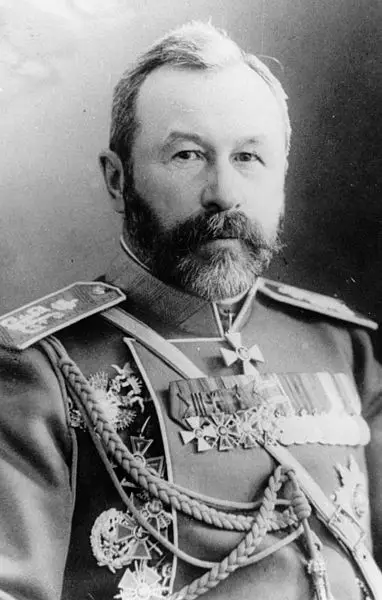
Alexey Nikolaevich Kuropatkin (1848–1925, Sheshurino) - Russian military and statesman, Minister of War (1898–1904), member of the State Council. During the Russo-Japanese War, he successively held the positions of commander of the Manchurian Army (February 7 - October 13, 1904), commander-in-chief of all land and naval armed forces operating against Japan (October 13, 1904 - March 3, 1905), commander of the 1st Manchurian Army army
Preparing Russia for war
Reacting to the rise of Western powers in the Asia-Pacific region, especially Britain, Russia began to strengthen its forces in the Far East in the 1880s. Petersburg had a huge amount of time to prepare the Russian Far Eastern borders for war. By the beginning of the Sino-Japanese War, Russian forces in the Far East had been increased to 30,5 thousand people and 74 guns. But a significant part of the troops were Cossack cavalry.
In anticipation of Russian intervention in relations between Japan and China, the border districts were reinforced with artillery. The Amur Governor-General Dukhovsky received instructions to strengthen local formations and strengthen Vladivostok, Nikolaevsk and the defense of Sakhalin.
Military activities were carried out slowly. First of all, this was due to the fact that Russia’s main attention was focused on the Western strategic direction; the main funds and forces were constantly spent on strengthening military power in the European part of Russia. The main wars of the Russian Empire were fought in Europe. And the eastern direction was financed on a residual basis; it was long considered secondary, if not tertiary. Therefore, by 1898, the number of troops in the Far East reached only about 60 thousand people with 126 guns.
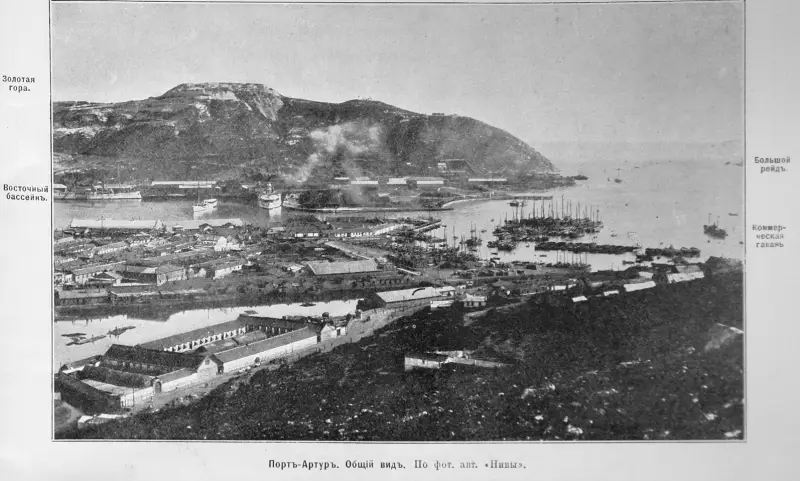
Port Arthur. General form. Photo from Niva magazine, 1904
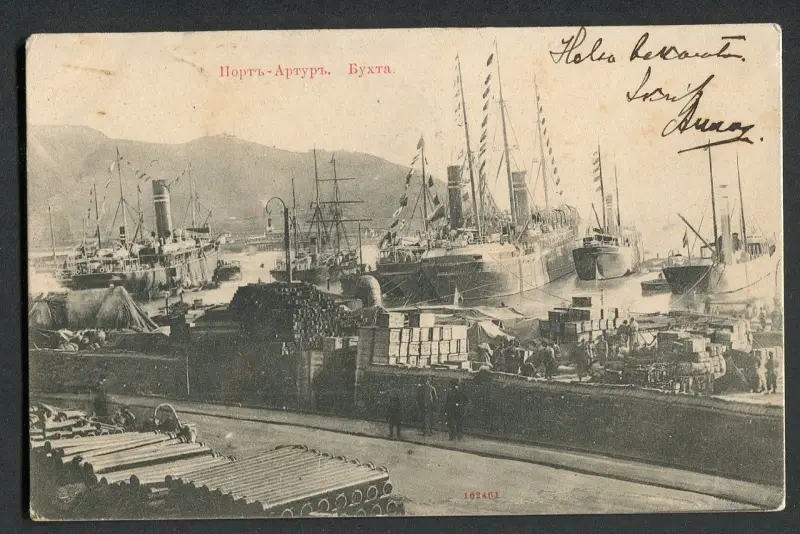
Lack of financial resources, sparse population, lack of roads, the rudimentary state of engineering preparation for the theater of war, the lack of barracks and the general underdevelopment of the military and industrial infrastructure of the region delayed the concentration of troops in the Far East. Japan at this time accelerated the pace of military development, trying to prepare for war before the Russians completed construction of the Circum-Baikal Railway.
In 1898, when Russia occupied Port Arthur and relations between the two powers worsened even more, a new military development plan was adopted, which provided for increasing the number of Russian troops in the Far East to 90 thousand people and 184 guns. Russian participation in military intervention against China caused by the Boxer Rebellion in 1900–1901. (How the Russians took Beijing by storm), led to the transfer of troops from European Russia and the formation of a number of new units.
The tense situation in the Far East required more and more attention from St. Petersburg. Viceroy Alekseev was ordered “to bring our combat readiness in the Far East into full balance with our political and economic objectives in the shortest possible time and without stopping at the necessary expenses.”
In accordance with this instruction, they planned to form two new army corps with a total number of at least 50 thousand soldiers. These corps were supposed to concentrate in areas of possible Japanese landing. The strengthening of the army group in the Far East was carried out not by sending new units from the European part of Russia, but by reforming local formations to include separate groups of soldiers sent from the European part of Russia. This was done so as not to weaken the army in the western strategic direction.
They planned to transfer two divisions and one brigade to the Kwantung Peninsula, as well as strengthen Port Arthur and Vladivostok. Port Arthur received a fortress garrison and fortress artillery. In 1903, two infantry brigades with artillery were transferred to the Far East. The garrison on Sakhalin was also strengthened. Cavalry was not transferred to the Far East; it was believed that it was more needed in the European theater of military operations. In Manchuria they decided to limit themselves to Cossack cavalry concentrated in the border areas.
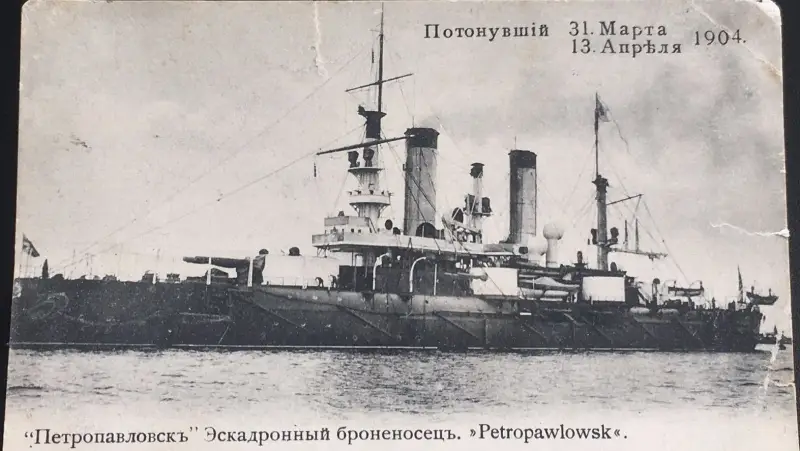
Postcard “Squadron battleship “Petropavlovsk”. Was the flagship of the 1st Pacific Squadron
Russian forces in the Far East
By the beginning of the war, Russia had about 98 thousand soldiers and 272 field artillery pieces in the Far East (in total there were about 125-150 thousand people east of Lake Baikal). The garrison of Port Arthur numbered 22,5 thousand people, in Manchuria there were about 28 thousand people, in the Vladivostok area there were about 45 thousand people. There were several thousand more artillery, engineering and other formations.
There was also a security guard for the CER (railway troops) - about 35 thousand people. The Trans-Siberian Railway was operating at the beginning of the war, but its capacity was low: 3–4 pairs of trains per day. It took about 1 month to transfer one army corps from the European part of Russia.
Although Russia had good relations with China, some troops had to be kept on the right flank to the detriment of the group in the most important eastern sector of the theater of operations. China was decentralized, and provincial governors and local generals did not always obey the center and pursued their own policies. Some of them could well cooperate with Japan. Behind the Pechili border stood the troops of the Chinese generals Yuan Shi-kai and Ma. Various gangs also carried out rampages in the provinces.
The war found the Russian army in a state of reorganization: two-battalion regiments were deployed into three-battalion regiments, brigades were transformed into divisions. Engineering preparations for the Far Eastern theater of operations proceeded slowly. The question of developing military infrastructure was raised only when the inevitability of war became obvious to almost everyone. The main attention was paid to strengthening Port Arthur and Vladivostok.
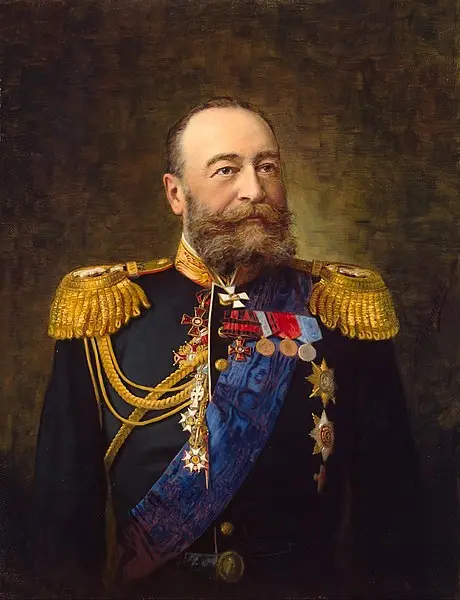
Portrait of Admiral E. I. Alekseev. A. F. Pershakov. According to some reports, Evgeny Ivanovich is the illegitimate son of Alexander II. On July 30, 1903, Alekseev was appointed Viceroy of His Imperial Majesty in the Far East. In this position, he showed extreme hostility towards Japan, supporting the desire of Russian industrialists to establish themselves in Korea and preparing a break with the Japanese government. In connection with the outbreak of the Russo-Japanese War, on January 28, 1904, Alekseev was appointed Commander-in-Chief of the ground and naval forces in the Pacific Ocean. After the death of Admiral Makarov, he directly commanded the Pacific Fleet until April 22. A number of major defeats of the Russian army forced the government to recall Alekseev from his position as commander-in-chief
The isolated position of Port Arthur required its powerful fortification so that the garrison could hold out for quite a significant period before the Russian army could launch a counteroffensive. The initial project for the fortifications of Port Arthur, the first stage, provided for a two-year construction period. However, various circumstances, such as the Chinese uprising, when workers simply fled, cholera epidemics, the remoteness of Port Arthur, and simply theft, slowed down the work. Construction work progressed slowly.
Since 1903, work has proceeded at a faster pace, but time has already been lost; the program for the construction of Port Arthur fortifications has not been fully implemented. They did not have time to implement the program for the construction of fortifications on the Jinzhou Isthmus (the small town of Jinzhou was located near the narrowest point of the Liaodong Peninsula, the most convenient place for the defense of the peninsula). The fortifications of Vladivostok were also not completed. The city could only repel the first weak attacks.
Thus, Russia, unlike the Japanese Empire, was not ready for war in the Far East. Work on strengthening Port Arthur and the Liaodong Peninsula and other fortifications were not completed; the railway did not allow the rapid transfer of troops from the European part of Russia. A sufficient army group was not concentrated in the Far East in advance, capable of resisting the Japanese army in Manchuria and Korea, or even preemptively occupying the Korean Peninsula, part of the coast of China and stopping the landing of Japanese forces.
We did not have time to reinforce the 1st Pacific Squadron. The detachment of Rear Admiral Virenius left Kronstadt for the Far East in 1903, but with the outbreak of the Russo-Japanese War it had to be returned from the Red Sea to Russia. The detachment could significantly strengthen the 1st Pacific Squadron. It included: the squadron battleship "Oslyabya", the 1st rank cruisers "Dmitry Donskoy" and "Aurora", the 2nd rank cruiser "Almaz", the destroyers "Buiny", "Brilliant", "Bystry", "Impeccable" ", "Bedovy", "Bodriy" and "Bravey", four destroyers, three steamships of the Volunteer Fleet "Orel", "Smolensk" and "Saratov".
The steamships of the Volunteer Fleet could be used as auxiliary cruisers for operations on enemy communications. It should be noted that, if desired, St. Petersburg could send most of the Baltic Fleet to the Far East before the war. Later, the 2nd Pacific Squadron was sent, but the decision was very late and led to disaster.
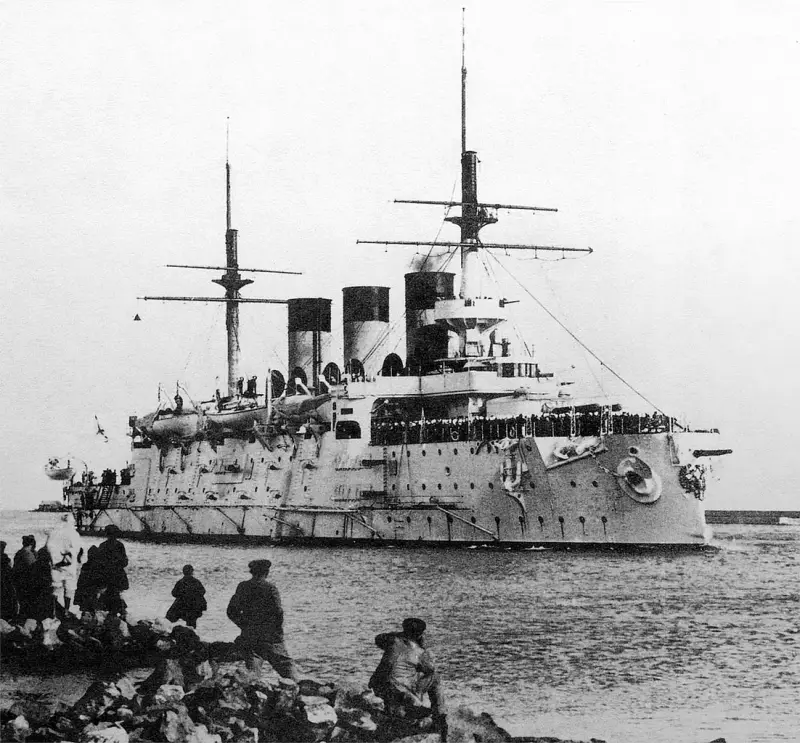
The squadron battleship Oslabya leaves Bizerte, December 27 1903.
59 ships and vessels of various classes remained in Port Arthur. Including 7 squadron battleships - "Tsesarevich", "Retvizan", "Poltava", "Sevastopol", "Petropavlovsk", "Pobeda" and "Peresvet", the armored cruiser "Bayan", armored cruisers "Askold", "Diana" , "Pallada" and "Varyag". One cruiser and one gunboat of the Port Arthur squadron were located in the Chemulpo roadstead.
In September 1903, Rear Admiral Ewald Stackelberg moved with a detachment from Port Arthur to Vladivostok. The detachment included: armored cruisers "Russia", "Gromoboy" and "Rurik", armored cruiser "Bogatyr". The defensive detachment of Vladivostok also included the gunboats “Koreets”, “Manchzhur”, “Beaver” and “Sivuch”, several destroyers and torpedo boats, and transports.
True, the gunboats were unable to strengthen the Vladivostok detachment. The “Korean” died in Chemulpo; "Manchu" was in Shanghai during the outbreak of the Russo-Japanese War, where he was interned. At the beginning of the war, the "Sivuch" was under repair in Yingkou; when the Russian army retreated from Yingkou, the gunboat moved up the Liaohe River and was then blown up. The Beaver was in Port Arthur, the gunboat received severe damage from Japanese siege artillery fire and sank.
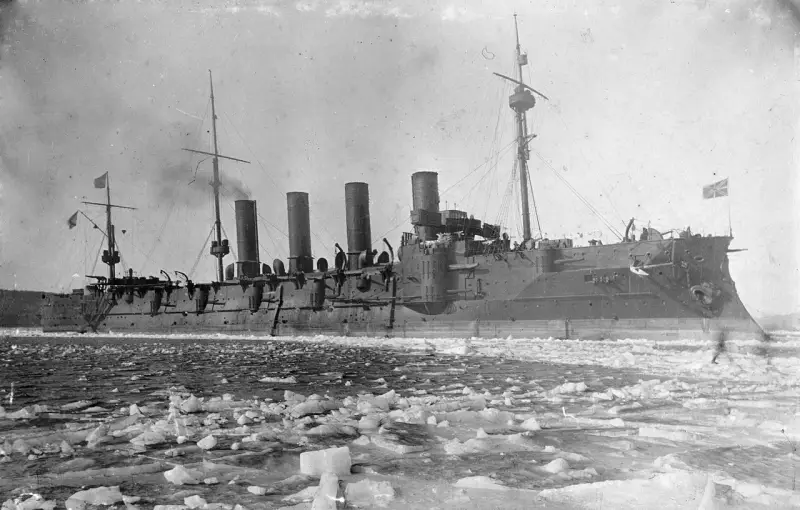
Armored cruiser "Gromoboy" in Vladivostok. 1904 Participated in the Russo-Japanese War as part of the Vladivostok detachment
Unfavorable political situation
The political situation for the start of the war was also unfavorable. The British Empire openly supported Japan. The United States also provided full diplomatic, financial, military and material assistance to the Japanese.
France, Russia's official ally, took a coolly neutral position. St. Petersburg should have taken a closer look at the position of its future Entente allies during the Russo-Japanese War and broken the alliance with France in order to avoid participating in the First World War as cannon fodder for London and Paris.
During this period, Germany was friendly towards Russia; it was beneficial for her that Russia would get bogged down in eastern affairs and be distracted from Western Europe. True, this did not stop the Germans from selling to Japan weapon and other products, business is business.
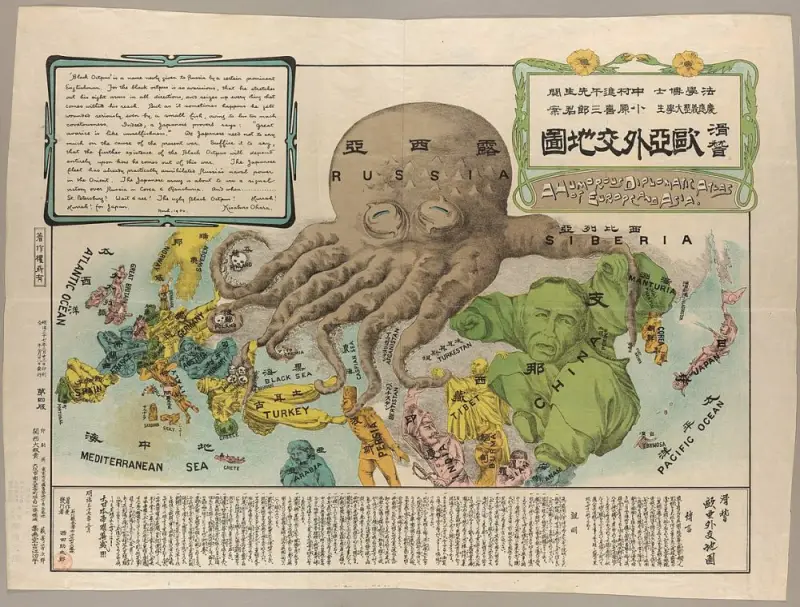
Anti-Russian satirical map prepared by a Japanese student at Keio University
The state of the Russian army. If it weren't for the generals
The Russian army in the second half of the 1877th - early 1878th centuries was in crisis, which was convincingly confirmed by the course of the Eastern War (Crimean), the Russian-Turkish War of XNUMX–XNUMX, the Russo-Japanese War and the First World War.
There were no complaints against the Russian soldier. Russian soldiers, as in previous times, showed courage and dedication. During the Russo-Japanese War, Russian soldiers and sailors showed exceptional heroism and resilience, which was repeatedly noted by foreign military agents stationed at the headquarters of the Russian and Japanese armies. The Russian non-commissioned officer corps was well prepared. Low- and middle-ranking officers also demonstrated the proper level of training.
The main problem was in the senior command staff. The royal generals, with some exceptions, turned out to be completely incapable of showing creative initiative. A feature of Russian (and then Soviet, which was confirmed by the initial stage of the Great Patriotic War) military education was overload with theory and lack of practice. Academic education suppressed common sense. Instead of practitioners, they brought up doctrinaires who were unable to understand and accept the new developments in military affairs. Conscious initiative was suppressed.
Future generals, in fact, were not taught to fight. Many of the generals occupied top command posts not so much because of their skills and merits, but because of their high origin, connections in high society, and the ability to please their superiors. They viewed service not as service to the Motherland and people, but as a source of material benefits and honors. Such “commanders” did not enjoy authority among the troops. These were generals of the “peaceful army”, incapable of innovation, initiative and decisive action. By the way, in my opinion, in the special military operation of 2022–2024. Russia has stepped on the same rake again.
The Russo-Japanese War completely confirmed the unsuitability of the generals. Kuropatkin accused his generals of disrupting a number of operations. Thus, General Bilderling during the battle of Liaoyang, having significant forces at his disposal, did not stop the encircling movement of Kuroki’s army. Kuropatkin blamed General Stackelberg for extreme indecision during the September offensive, as a result of which the well-planned operation failed. General Kaulbars failed the Mukden operation. Despite repeated orders and numerous reinforcements sent to him, he stubbornly did not go on the offensive and gave the enemy two days.
While Peter's practice worked - future generals began serving as soldiers, like Suvorov, the Russian army was invincible. But the system was broken. The generals were filled with sycophants, opportunists, careerists, and service workers who knew how to “serve beautifully” in peacetime. The highest positions were filled with sons, relatives of generals and aristocrats who had never smelled gunpowder. The degeneration of the elite of the Russian Empire fully affected the generals.
Suffice it to recall the illegitimate son of Emperor Alexander II, Admiral General Yevgeny Alekseev, who, being a member of the so-called. of the Bezobrazov clique, as the main commander of the Kwantung region and the imperial governor in the Far East, like no one else, he contributed to drawing Russia into the confrontation with Japan. At the beginning of the war, Alekseev was appointed commander-in-chief of all ground and naval forces in the Far East and was responsible for the failure of the initial period of the war.
The operational art was based on the doctrine of General Leer, who was based on the art of war of the Napoleonic Wars era. The military art of the era of the wars for German reunification has not been well studied. Only in 1907, on the instructions of the Chief of the General Staff Palitsyn, the Academy of the General Staff began to study the features of military art from the era of the wars of 1866 and 1870–1871.
Thus, Clausewitz's dialectic was completely not reflected by Leer. In addition to the tenets of Napoleonic art, defensive tendencies played an important role among the senior command staff of the Russian Imperial Army, which were combined with the recognition of the benefits of concentration for actions in internal operational areas. The generals, with some exceptions, did not study the experience of the Anglo-Boer War and the last Sino-Japanese War, which became a rehearsal for Japan for the Russo-Japanese War.
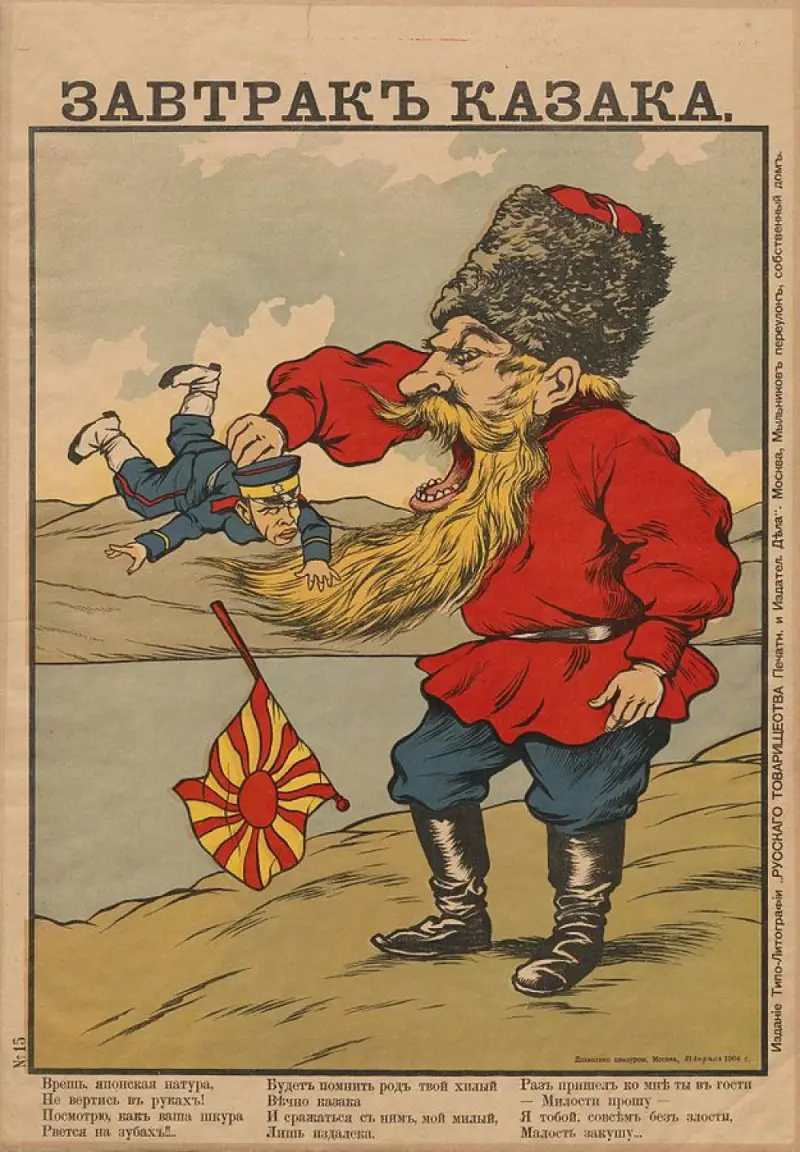
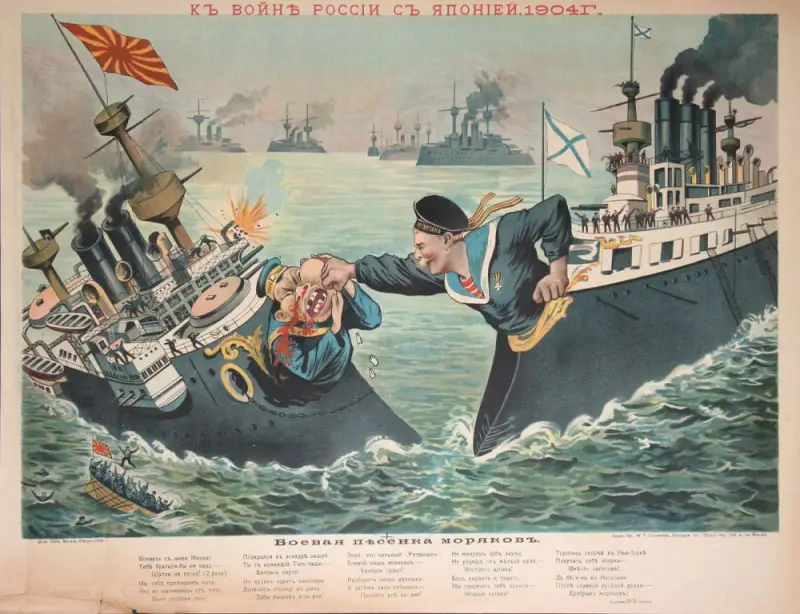
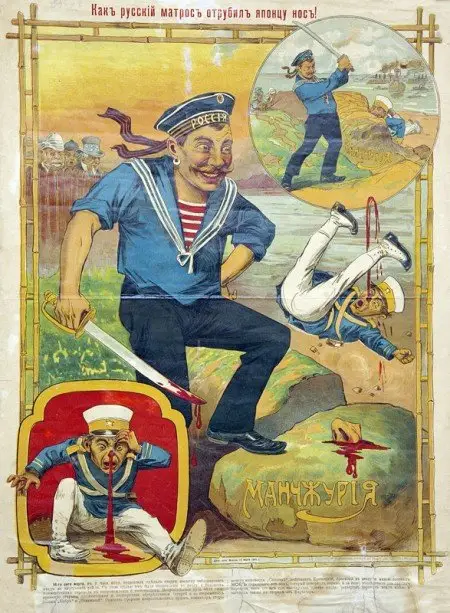
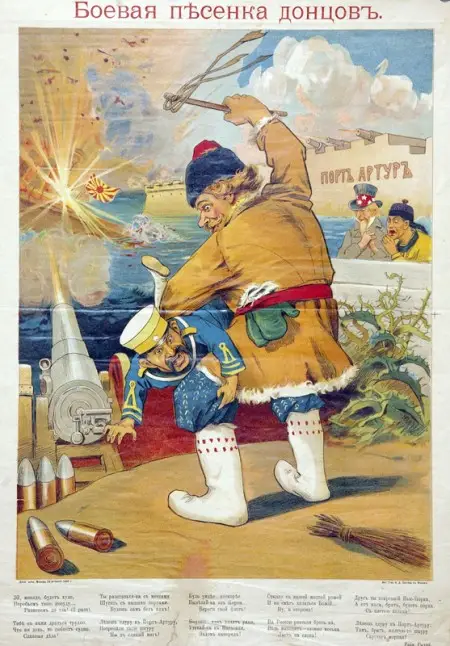
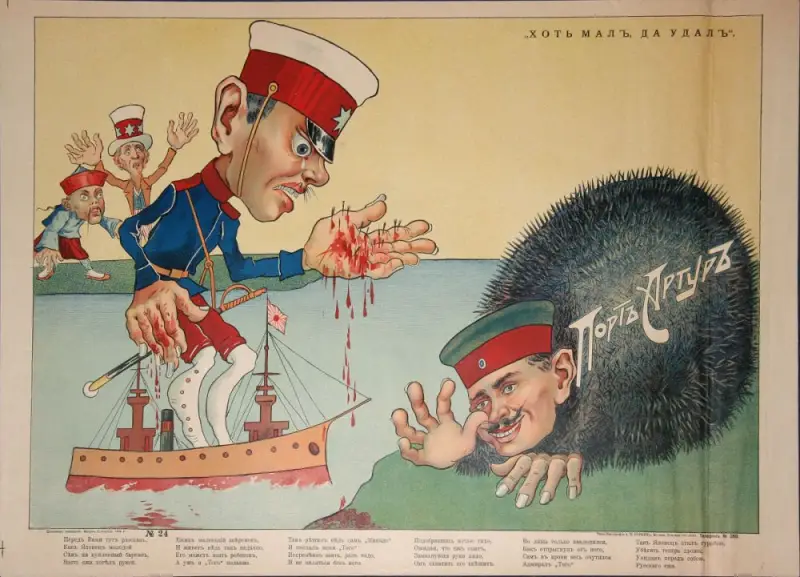
Russian propaganda posters from the Russo-Japanese War. Shows the degree of mischief-making sentiments in Russian society
Plans of the Russian command
Most military and political leaders believed that victory over the “weak” and “savage” Empire of Japan would be achieved with little effort, without disrupting the process of preparing for war in the West. The concept of a “small and victorious war.”
The plan for war with Japan, developed by the end of 1903 at the headquarters of Governor Alekseev, was based on optimistic assumptions about the superiority of the Russian fleet over the Japanese and the possibility of concentrating the Russian army in the Mukden-Liaoyang area before the arrival of the main Japanese forces. The Japanese army was underestimated, both in numbers and in terms of combat effectiveness.
Kuropatkin believed that the most important task of the army was “the concentration of our troops.” Until this moment, it was possible to sacrifice any local points and positions in order to prevent the enemy from defeating our weak army. Only by concentrating the main forces could it be possible to launch a counteroffensive.
It was believed that Japan would be able to transfer about 200 thousand people with 684 guns to Korea and Manchuria. The potential for growth of the Japanese army due to new mobilizations and the possibility of further transfers to Manchuria were considered unlikely. Based on such forces, it was assumed that the Japanese army would be able to develop an offensive in only one main direction: towards Vladivostok, Mukden or Port Arthur.
The possibility of simultaneous active offensive actions by the Japanese army in two operational directions, as well as the defeat of the Russian fleet, were not taken into account.
Already during the war, the unforeseen possibility of developing offensive operations of the Japanese army in two directions at once took the Russian command by surprise. Already on the way to Manchuria, Kuropatkin made a number of clarifications and amendments to the plan, suggesting that the Japanese army would first attack Port Arthur and at the same time, in anticipation of the offensive of the Russian troops, would strengthen itself in Korea.
The Russian army could begin active offensive operations no earlier than six months after the start of the war. They planned to achieve gain in time by defensive actions on a number of defensive lines - from the Yalu River, the Fenshuiling Range, etc. At the first stage of the war, it was planned to act as carefully as possible in order to prevent the enemy from being defeated in a decisive battle.
After concentrating sufficient forces, War Minister Kuropatkin planned to go on the offensive, oust the enemy from Manchuria and Korea, and then, if necessary, conduct an amphibious operation on the Japanese islands. The starting area for the Russian offensive was considered to be the Liaoyang-Haicheng region. From here it was possible to provide timely assistance to Port Arthur.
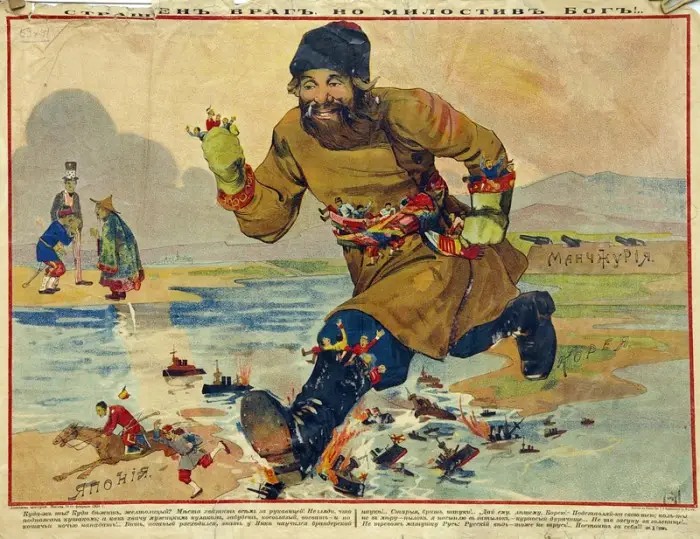
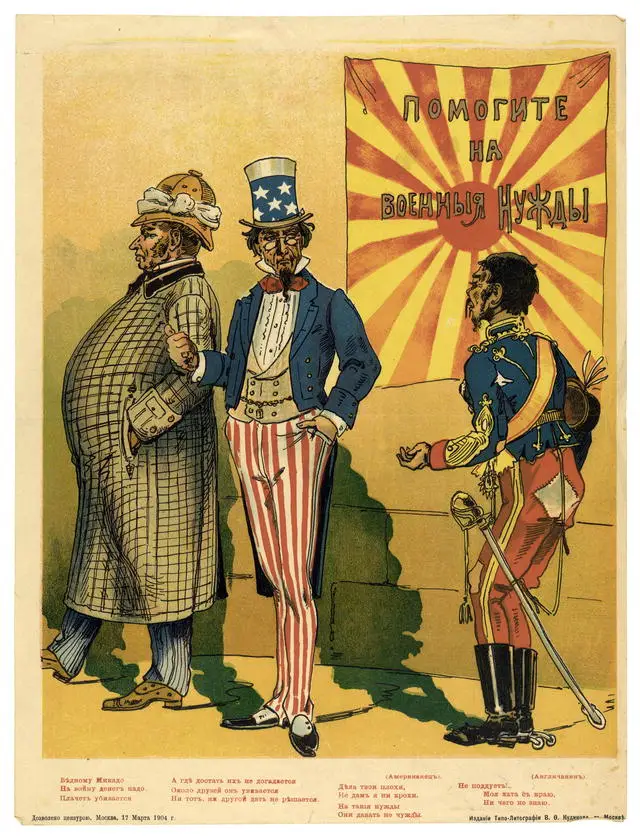
Great hopes were placed on the cavalry, in which the Russian army had a complete advantage. The cavalry had to wear down the Japanese infantry with its raids.
In addition, it was believed that the Japanese would not be able to organize the rear, the supply of ammunition, food, and this would lead the Japanese army into “moral and material disorder, which must be taken advantage of for decisive strikes.” However, as the course of the war showed, the Japanese did a better job organizing the rear than the Russian army, having thoroughly studied the theater of military operations in the pre-war period.
The tsarist generals were unable to use their advantage in strong cavalry to break through enemy lines, destroy communications, and wreak havoc and destruction in the style of future white and red commanders during the Civil War.
In general, Kuropatkin's plan, with initially weaker Russian forces in the Far East, could lead to success, but under two main conditions.
Firstly, it was necessary to implement it, which, given the low quality of a significant part of the high command, was a difficult task. The personnel problem ruined the best ideas.
Secondly, political support was needed in St. Petersburg. The Russian public should have calmly reacted to the period of concentration of the Russian army, when it would slowly retreat, losing position after position.
However, as the war showed, the public and high society were not ready for the retreat of the Russian army at the first stage of the war. Defeatist sentiments in St. Petersburg and pressure from the world community did not allow the Russian army to carry out Kuropatkin’s strategic plan and move on to the second stage - the offensive against the exhausted Japanese army. The Russian army was simply not given time to win.
The plan for the use of the Pacific Fleet, approved in December 1903, was wishful thinking. The high command practically missed the development of the Japanese fleet after the Sino-Japanese War, although the creators of the war plan were sitting not far from the Japanese shores - in Vladivostok and Port Arthur. The fleet was supposed to establish dominance in the Yellow Sea and prevent a Japanese landing in its base area.
At the same time, a small cruising detachment, based in Vladivostok, was supposed to operate on the enemy’s sea communications. Before the war, they did not think of seriously strengthening the Vladivostok cruiser detachment, although there were excellent opportunities for this. It was possible to use the ships of the Volunteer Fleet, which was created specifically to solve such problems. The organization of the cruising war in the Pacific Ocean in the pre-war period was a failure.
The war plan took into account the usual outbreak of hostilities after a declaration of war, but the fleet was not prepared to repel an attack by Japanese ships. Although the possibility of a surprise attack by the Japanese on the Russian squadron was foreseen at the Main Naval Headquarters and at war games, Makarov warned about this.
As a result, the calculation of the Russian command that the Russian fleet would dominate the sea, and therefore the Japanese would not be able to land on the northwestern coast of Korea and on the shores of the Liaodong Peninsula, failed.
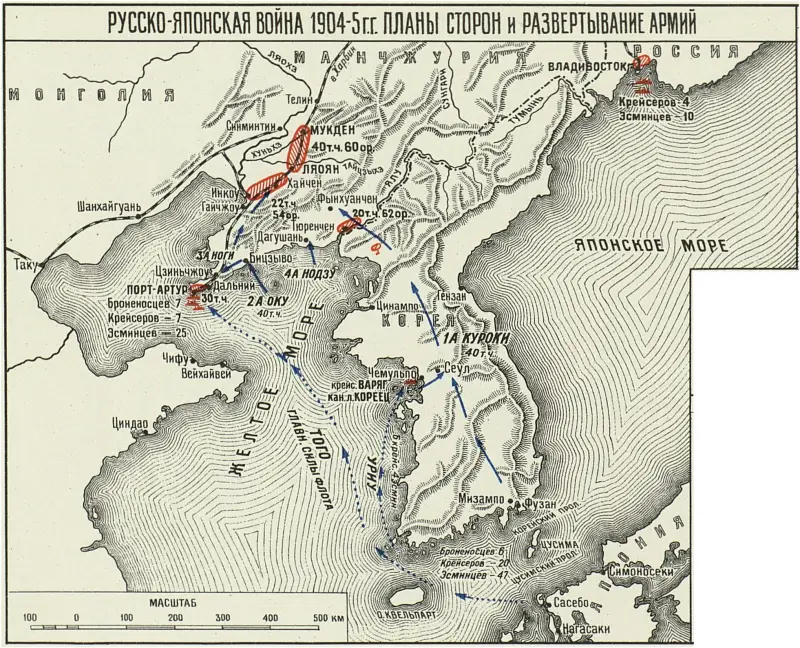
Information